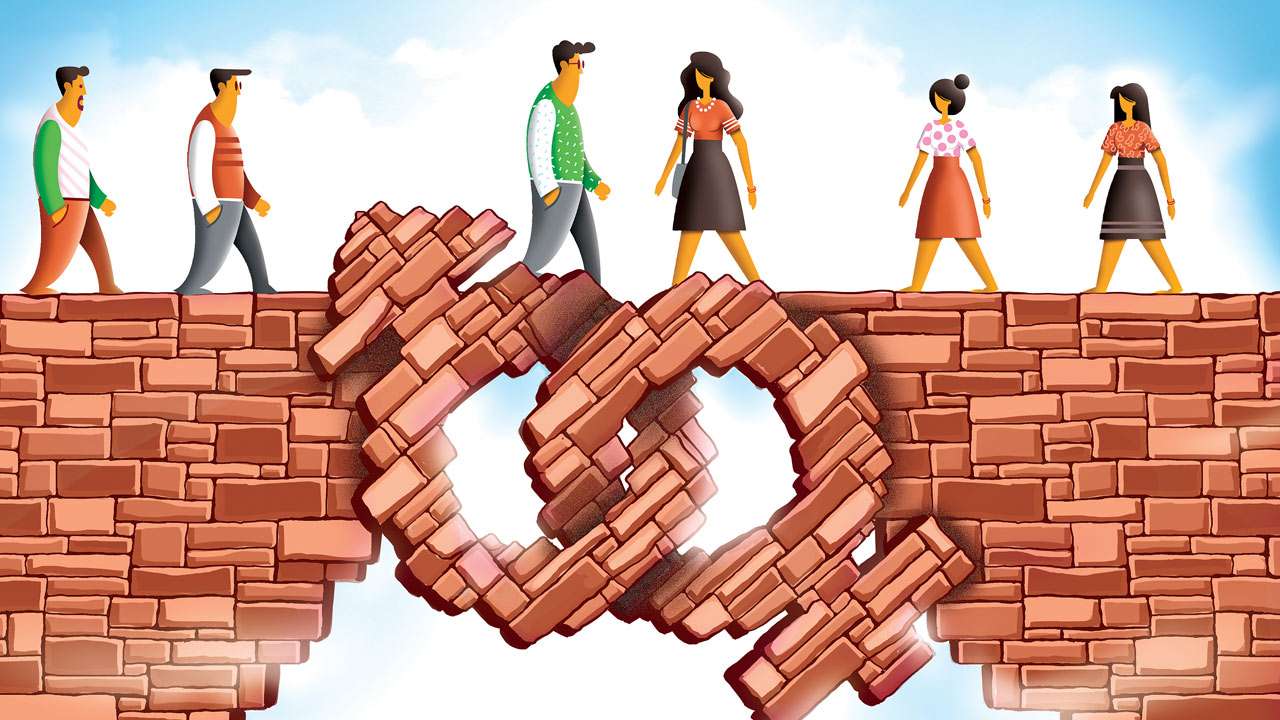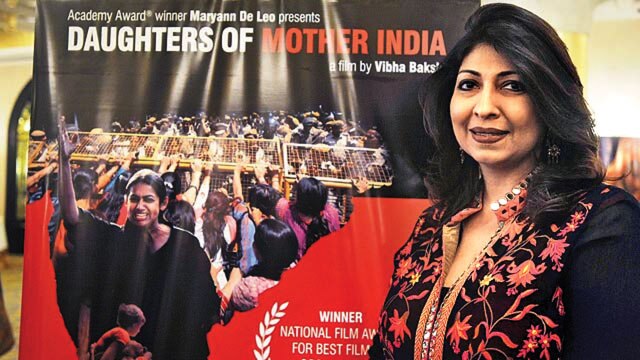
It was at a friend's wedding that Mumbai-based media professional Tanzila Anis and her friends got into a discussion about women in relationships, both personal and professional. Stemming from this conversation was the big question: are the men of our generation disadvantaged? Following this, in an articulate Facebook post, she wrote, "While young girls and women are taught to be more proactive, ask for what they want and make independent choices, which helps them become more emotionally mature, are we ensuring that young boys and men are offered the understanding to cope and move with the times?
Women are told to express and not shy away. To claim their spaces. The men are told to continue in a changing environment with the same notions as generations had before them. They are caught in a vortex of extreme turmoil. These are modern men. They want to move with the times. But they don't have the emotional skills to be able to do that. No one's teaching them how to cope. The women are becoming stronger in their emotional spaces. The men stunted. (sic)"
Whether or not the men of this generation are disadvantaged has made up for a lot of our coffee-table conversations. But let's consider that if men are indeed disadvantaged and the feminist movement isn't completely foolproof, birthing more qualms than progress, then how do we begin to change that? And where do men play a part in the struggle for gender equality?
In the many workshops that senior manager at Rizwan Adatia Foundation Sasmita Sahani conducts about sexual health and hygiene, she likes to begin with gender. These workshops are attended by teenagers, young adults and even old people. "I am often asked why I begin with gender roles before getting to the 'real' issue (sexual reproduction). The answer is simple: when one understands gender, one understands power," she says.
Gender roles are essentially how societies expect both men and women to behave. Sahani says, feminism "challenges and threatens those in power – the men." As a result of these long-standing stereotypes, many men prefer to withdraw from conversations surrounding women issues and feminism.
This, believes Anis, is a result of decades, possibly centuries of conditioning. "There are a lot of things that are intrinsic in humans," she begins, adding that the nonchalant attitude that most men nurture does more harm than good. "They often think 'ye toh sadiyo se chala aa raha hai, tab theek tha toh ab kyu nahi?' (These practices have been on for ages. It was fine then why not now?)"
That men have always been in a position of power is undebatable. Be it the wage gap (which was estimated at 24.81 per cent for the year 2013), to running governments [according to a report titled Women in Politics 2017 Map published by the Inter-Parliamentary Union (IPU) and UN Women, women make up only 11.8 per cent (64 MPs) of the 542-member Lok Sabha and 11 per cent (27) of the 245-member Rajya Sabha] – men are in power to set rules.
However, when feminism gets to really question this status quo, that is when many feel threatened. "Men don't really want to see their own privilege threatened, but I think even before we get to that level of explanation, it's actually that they aren't very interested in women's opinions or readings of the world," elaborates Richa Kaul-Padte, the author of Cyber Sexy. She continues explaining with a recent incident from her life, "At an event for the book in Mumbai, a man asked me a long- drawn question (more like a comment) and when I started replying, he looked in another direction and was clearly not listening. So many people noticed that, but he obviously thought it was fine. I think men constantly disregard women's voices, and this disinterest in engaging with women on feminism is often another example of that playing out," she states.
There is a certain nonchalant attitude coming into play when women's issues and rights are brought up. "An attitude that often directly translates to: it is your problem, not ours," adds Sahani.
"We are told that the universe revolves around us," says a male stand-up comedian on the condition of anonymity. "Feminism threatens the privilege that we are born with. Obviously, we don't want to let go of that, so we chastise anything that intimidates it. Any kind of equality would mean that we don't get to enjoy our privileges and feel superior any longer," he adds.
Consider the wage gap, he tells this writer. "The salary gap is men telling women that they deserve less. So you know now who is in power. Men don't feel as threatened by men as they do by women."
Women empowerment is closely related to economic empowerment, concurs Sahani. "When women work, they earn, they make their own money – and so they understand power. However, many women are not even allowed the chance to explore that," she rues.
Many find that conversations around feminism are driven by jargon.
"Toxic masculinity, patriarchy, agency over one's body – these are terms that aren't in everybody's vocabulary. Not everyone is equipped to fully understand the etymology of these terms, let alone how they contribute to these problems. I have a problem with the constant usage of these terms because not everybody can fully fathom what they entail. And this leads to a dissipation of the subject," Anis explains.
For instance, Anis herself has been a feminist for as long as she remembers, but it was only sometime back that she came across 'intersectional feminism'. "These terms and categorisations are beneficial in the English language for academic purposes, but in a country where the larger population doesn't speak English, what purpose does it serve?" she questions. As a result of this, discussions are not always fruitful. "I was thankful that I happened to be in a space where my male friend was open to being vulnerable in telling me his thoughts on why men are disadvantaged. This, unfortunately, doesn't always happen because from a young age, men are taught to not open up. Had I used terms like toxic masculinity, patriarchy, agency, intersectional feminism and whatnot, he probably would have avoided talking altogether," she says.
At the same time, Kaul-Padte believes that language plays a larger role than posing as an apparent threat. "I am a reader and a writer, and I believe that language constructs our world. I think to give what may only exist as an abstract idea, or alternatively, as a trend an actual name, is important in giving it shape and making people feel less alone in their experiences. So for example, the term 'domestic violence' is very important because it allows women who are experiencing this violence to see it as something prevalent and systemic, and not just something their husbands are doing," she says, adding, "The other way I look at this is trying to question the increasing rigidity of the language of resistance. Because these are English words that come from activist movements or academic contexts, and sometimes I feel like knowing these phrases, say 'toxic masculinity', has more to do with a performance of 'wokeness' rather than actually trying to address these issues," she says.
Kaul-Padte says she is not one to tone down for the benefit of others. "I am certainly not for the watering down of language or ideas to make the fight for equality palatable to people who are benefiting from that inequality (in this case, men), but I do think that we need to be less rigid in our defense of these terms and not use them as a beating stick against those who don't know them."
There are two options: women either add to their emotional labour in trying to help men catch up or just leave and move on.
Anis, through her professional and personal life, has been in both these situations. "It is not always rewarding when you wait on a man, helping them develop the emotional skills to cope with women. But one or two months down the line, you are going to know if it will be worth it," she says.
At the same time, Kaul-Padte has decided to not hold back her words. "I used to undertake this labour constantly, but now I am tired. I hope the things I write can do some of this work, but these interpersonal interactions in which I have to convince men to see me as a human being? I am just so done."
Sahani, however, believes in an unanimous growth and is attempting to change the narrative. As a mother of a three-year-old son, Sahani is teaching him feminism one day at a time. "We encourage the family to talk about periods as a regular thing – not in hush-hush tones. I enjoy cooking and ask my son to join. He happily offers to help in the kitchen till I have to tell him he is making more of a mess," she giggles.
Children, after all, are the future.

Documentary filmmaker Vibha Bakshi, who made the National Award winning Daughters of Mother India (DOMI) in 2015 in the aftermath of the gruesome 2012 Nirbhaya gang rape, is on the verge of releasing the sequel titled Son Rise. Set against the backdrop of the rural villages in Haryana, where patriarchy and gender biases are rampant, the film finds ordinary men who take on the extraordinary fight to rise above the structures of male dominance that surrounds them – and change the narrative of masculinity in India.
Bakshi believes that while women are, and have always been, struggling for generations, the real conflict is that men haven't. "I think the man is struggling a lot more because what has happened is that we [the women] have changed, but was he prepared for this? That's where the conflict lies. You find your man, you marry him, but how he is raised, his thinking, his exposure, may have left him unprepared for women like us. And that is something that has to be addressed, since society is changing; as we are growing, evolving, it is becoming less about us, about the women," she says.
The filmmaker recalls how during the world tour for DOMI, everybody presumed she was the mother of a daughter. "But no, I am a mother of two sons and I truly believe that I carry a greater responsibility about how I am raising them. Because, if I raise them with an unnecessary sense of entitlement, I will be a part of the problem," she sternly says, adding, "It really comes down to how we are raising our boys and prepare them to embrace the change."
And that is where she is looking to change the narrative. "The men now need to step up. They are very much a part of the struggle. Even the UN mandate for the feminist struggle – the whole #HeForShe – stands for unity. As long as men and women aren't involved together, we will never win the fight. The moment to change is now – it is not tomorrow – it is now!"